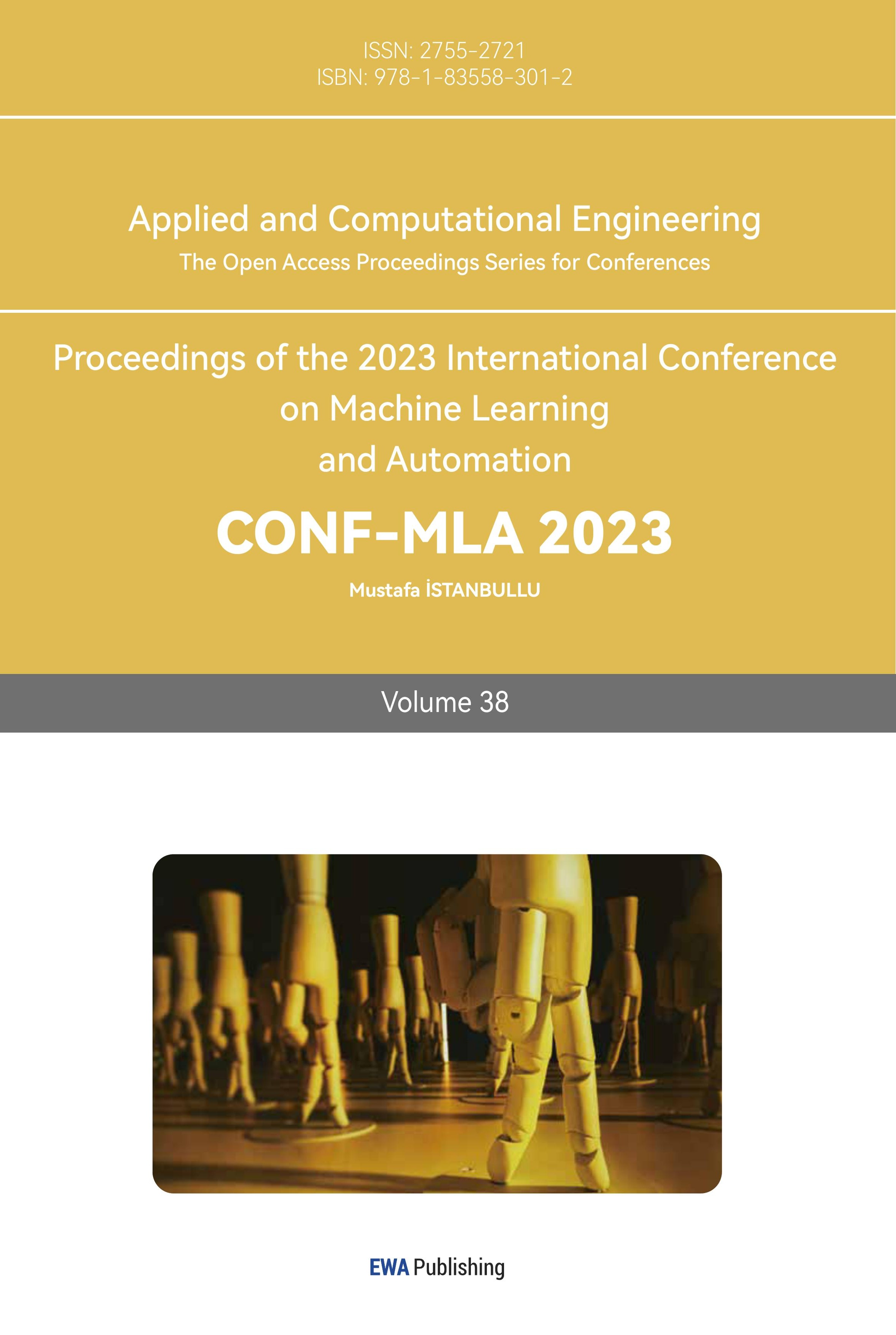1. Introduction
Library management system as a platform to provide services to readers, which has a huge scale of data, the traditional data processing methods cannot meet today’s needs. Through mining the large amount of data generated by the user, the system can provide users with better services [1]. Libraries need to interconnect and unify resources, entities, users, and technology networks.
Why the digital database system is need. Because some of today’s libraries suffer from a range of problems such as poor reading systems and inefficiencies. To reduce the waste of time the system is designed. The value of constructing the database is increasing. It contains several parts, for example, creating more complete reading resources and providing more knowledgeable and intelligent services [2]. The development of modern technology affects all aspects of social life, manage system has become an important way to speed up the construction efficiency and the improve of quality, libraries are no exception. The traditional library management and services rely on library staff to carry out manually, the cost of manpower and time is high, but also cannot provide personalised services for each reader’s needs, the management and service efficiency is low with drawbacks [3]. The significance of constructing database-manage-system is helping customer with more efficiency and comfortable. For now, the application of digital database system shows an increasing trend. People who are professional in the field of database system for libraries are not efficient. At this stage, libraries should introduce talent people, carry out professional training, and encourage professionals to participate in deep development of technical cooperation and other modes to continuously improve service skills [4]. Design a database system is the key for managing library data and service to the customers. Database technology is one of the key technologies to achieve the management system, it can not only complete the organisation and storage of data, but also a favourable tool for data analysis. Through the reasonable analysis of data to provide data support for the management of the library [5]. Because of these advantages, a database management system seems a good application for public libraries. Nowadays, database provides a new way of storing the books, it provides variety ways for customers find the collections they want. By construction the database system, three rules need obey which are principle of uniqueness, principle of standardization, principle of sharing [6]. Some essays write about the influence of database for the library [7][8][9] focus on the transfer from traditional library to digital one and different type of management for different types of libraries. These all shows that in recent environment, the database-manage-system for a library is a new trend. In this essay, it focuses on these problems and build a complete database-manage-system.
2. The construction of database
2.1. The introduction of database
In this article, a database system is constructed with data of books, reservations, library cards and so on. These functions are usually appeared in the daily libraries.
Figure 1 shows that the library service system is worked by 4 different categories. The service system contains Customer, Department, Library and Special events. From the chart, customers who come to library need library card and reservation in advance. The department has employees who will serve the appointment made by customers. The whole library contains collections, and the data of contributor and publisher will store in the collection part. There are also special events hold by library. The library service system will provide the Time Schedule to the customer.
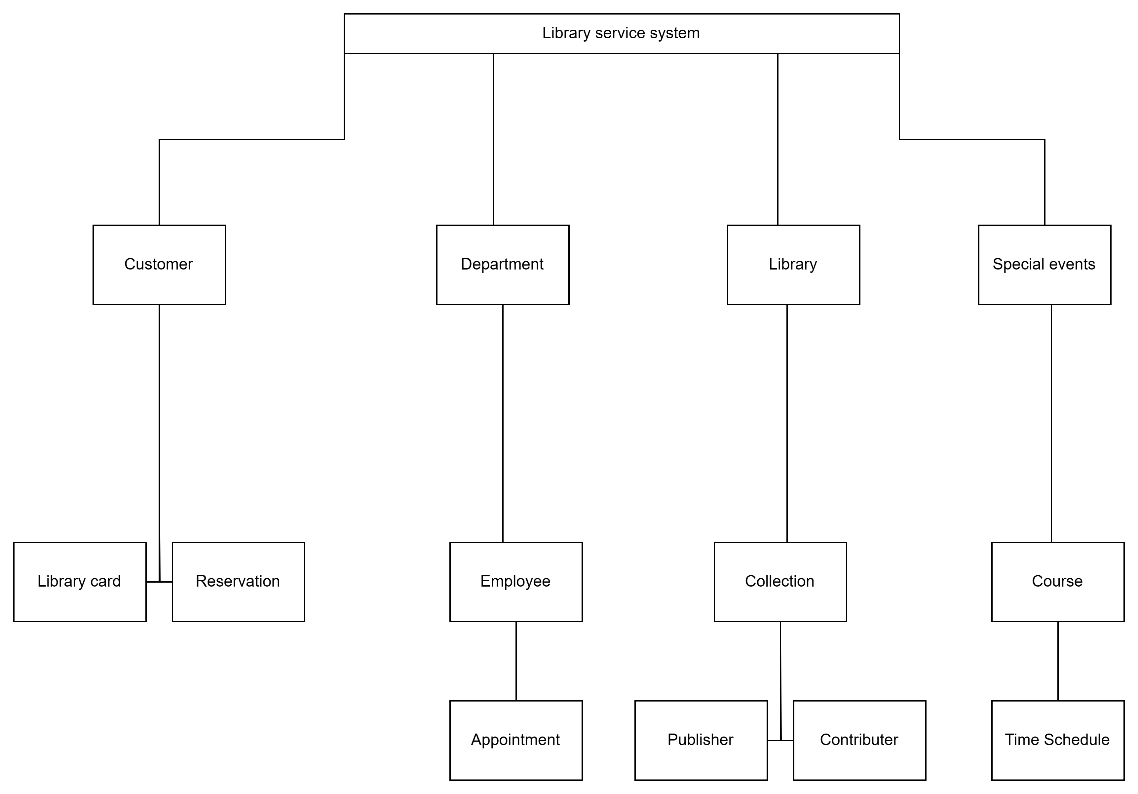
Figure 1. The flowchart of library service system.
2.2. E-R diagram
The entities in the graph are Library, Employee, Customer, Library Card, Collections, Publisher, Contributor, Special Events, Appointment, Reservation, Department, Course and Time Schedule (Figure 2).
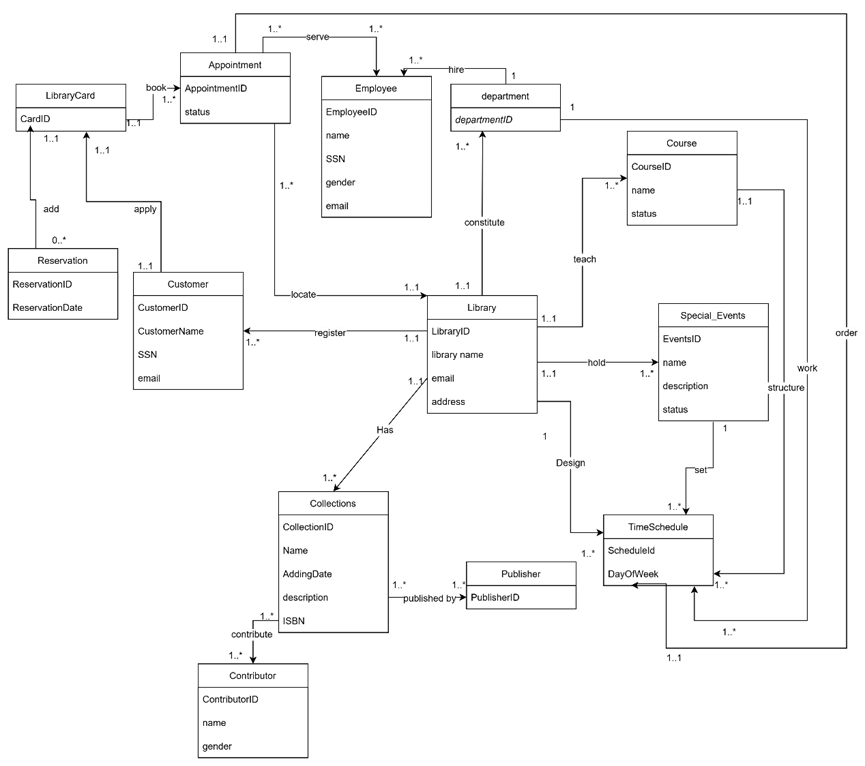
Figure 2. E-R diagram.
For different entities there are variety of attributes.
Library, in this entity, it stores the data of LibraryID, name, email and address.
Employee, the entity stores the people’s name, SSN, gender, email which hired by the department.
Customer entity contains customers’ id, name, SSN and email.
Library card entity is a card required to enter the service system.
Collections are stored in a specific library with collectionID, name, ISBN etc.
Publisher entity is the publisher of a collection storing PublisherID.
Contributor entity is the contributor of a collection storing ContributerID, name and gender.
Special Events are events held by a library for people to attend storing eventsID, name, description and status.
Appointments entity is customers can make an appointment with employees for some services storing the data of AppointmentID and status.
Reservation entity is the record of reservation when a customer reserve or borrow a book in the library storing the reservationID and date.
Department entity is department associated with the library storing the departmentID
Course entity is held by the Special Events storing coursed, name and status.
Time schedule entity stores the data of customers’s requirements storing ScheduleID and the date.
2.3. Analyse of relation
The database store customer information, including their name, Social Security Number (SSN), email. Each customer should have a unique customer ID (CustomerID) as the primary key.
The system should support customer registration and manage the unique library cards. Each library card should have a unique card ID (CardID) associated with a specific customer (CustomerID).
Customer should also be able to make appointments with library staff if they need and help. The time schedule, ID (AppointmentID), and the status would be recorded. One customer can register at only one library, but they can use the service from all Boston Public Library. A library can have one to many customers. After they registered at a library, they will receive their unique library card. Each library card can hold reservations at the same time.
The database must store employee information, including their name, Social Security Number (SSN), gender, email. Each employee should have a unique employee ID (EmployeeID) as the primary key.
Employees should be associated with specific departments within the library. An employees can only work in one department at the same time. The database should store information about the appointments they served. One appointment can be served by multiple employees depends on the appointment details.
For library:
The database will store the basic information for all related Boston Public Library. Information includes name (LibraryName), contact, email, address, and the specific time schedule to show when the library open on each day.
Each library can hold some special events that free for publics to join. One library can hold multiple events at the same time, but every event at different library should be unique. The database will store the ID (EventID), name, description, and status of every events.
Library also provides some general courses to the publics. Similarly, the course name, schedule, status would be recorded.
The database should also be able to manage its collections. The collection is virtual item in the library. Each collection has a unique ID, name, the data added to the library (adding date), description and the ISBN. The public information will include the publisherID, name and the city.
For every collection, the database will also record the contributors. One collection can have one to many contributors. Each contributors’ name, gender, age would also be recorded.
2.4. Normalization
When using normalization, the relationship between each entity would be described clearly. In table 1, different entities have different relationships with other entities. Also, in normalization, the foreign key would be also identified easily.
Table 1. The library tables.
Library table |
LibraryID -> LibraryName, email, address |
Contributor table: |
ContributorID -> ContributorName. Gender |
Publisher table |
PublisherID->-PublisherName. Country, |
Collection table:e |
CollectionID-> CollectionName, AddingDate, ISBN. |
collection _contributors table: |
(ContributorID. CollectionID) -> (no other attributes) |
publisher_ publish_collection table: |
(PublisherID. CollectionID)->- (no other attributes) |
Customer table: |
CustomerID -> Customer Name. SSN, email, libraryID |
LibraryCard table |
CardID -> CardStatus, CustomerID |
Reservation table: |
ReservationID-> ReservationDate, CardID. |
Appointment table: |
AppointmentID -> Appointment Type,CardID. libraryID~ |
SpecialEvent table: |
EventID -> EventName. EventDescription. EventStatus libraryID |
Course table: |
CourselD -> CourseName, CourseStatus, librarID |
Department table: |
DepartmentID-> DepartmentName, email, libraryID |
Employee table: |
EmployeelD -> EmployeeName, SSN, gender, email, EmployeeStatus, DepartmentID Employee_serve_appointment table: |
(AppointmentID. EmployeelD)-> {no other attributes} |
TimeSchedule table: |
ScheduleID: -> DayOfWeek, libraryID, AppointmentID, CourselD, EventID, |
DepartmentID |
2.5. Relational model diagram
The figure 3 shows the relationship between different entities. There are some different parts from the ER model, because of its relation.
Every entity will have Primary key [10]. The database designer chooses the primary key as a candidate key to be utilized as the identifying factor for the entire set of entities.
Contributor_collection:
Because the relationship between contributor and collection are both 1 to many (1..*) It should obey many to many form [10]. The following considerations apply to relationships between numerous people: Two 1:M relationships can be created from it. As needed, other qualities can be added. By constructing a composite entity or bridge entity, it can avoid issues that are inherent in a M: N relationship.
In this case, the publisher_publish_collection, employee_serve_appointment shows the same relationship. Then, the foreign keys here also demonstrate the relationship between each other. If the entity has foreign key, it shows that not only one relationship between two entities. The foreign key should be listed under its primary key.

Figure 3. RM model.
3. Function and test
After the ER diagram and relation model, the test is important which could help find the problems or bugs in the system. An user environment would be set up and entre different types of command to test the whole system.
3.1. Function implementation
Through the figure 4, it shows the function of list name. Adding the collection name, not only the publisher and contributor, but also the ISBN and the location of the book. Also, the status of the course could also be check by this system. Because customer need use their ID to borrow and return books, the libraryID is also listed. Because libraryID is not only use in the course but also the collection and appointment.

Figure 4. The representation of the application.
In the test of the database, the function of searching name of Library, check of appointment, check certain time interval events are also be realised in this application. In the whole project, customer could use the library database system to satisfy their requirements.
For example,
1.Book return management: Based on the library card number, book ID, and other information provided by readers, in the borrowing information table.
2.Calculate and register penalty records. Renew for readers with special requirements (renewal must be done before the deadline.
3.Borrowing management: Register borrowing related content based on the reader’s borrowing ID number and book number.
4. Borrowing information query: Based on the library card number provided by the reader, query the situation of the reader borrowing and returning books.
3.2. Test of data
After the database is set, several functions could be verified.

Figure 5. Appointment output from MySQL.
In figure 5, it shows that the database of Appointment entity. Firstly, select the type, date, time, employee and status need show on the table. Then, locate the employee and set up the time. The table would show the section selected from the whole library service system.
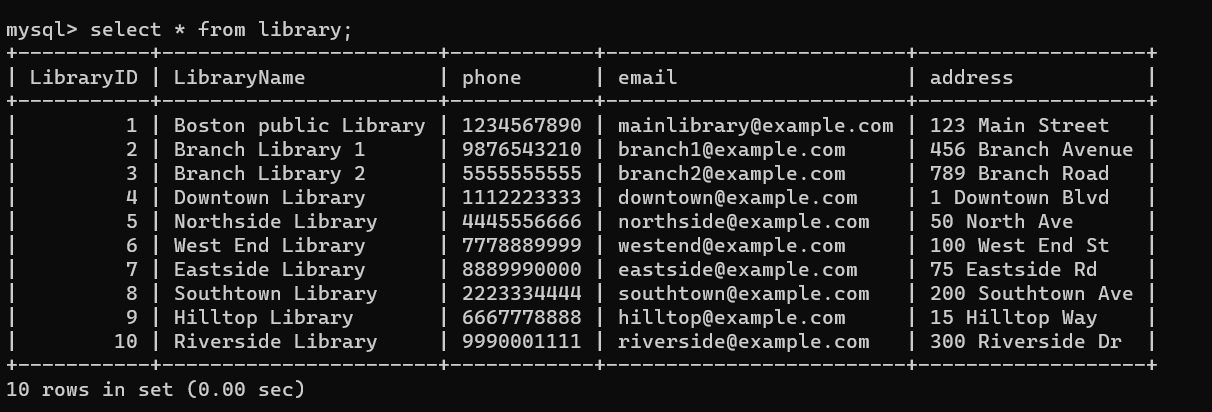
Figure 6. Library output from MySQL.
The figure 6 illustrates the table of Library. ID, name phone, email, address are attributes set previously in the database. Through the command, the table give the data about Library by using SELECT *.
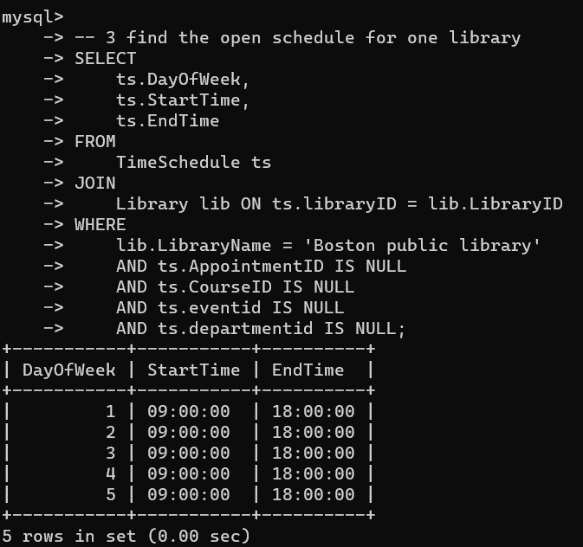
Figure 7. Constant time interval output from MySQL.
To realise this function, two times need to be set in the command. The database would find the information between the time intervals. The FROM and WHERE help the data- base located the data. The figure 7 would be shown with time selected before.
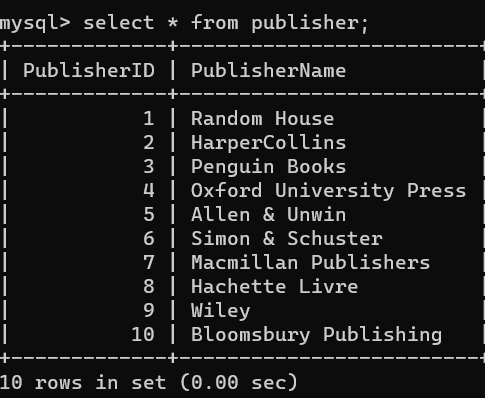
Figure 8. Publisher output from MySQL.
In this part, the figure 8 shows the function of publisher entity. The SELEC* form is need in this function.
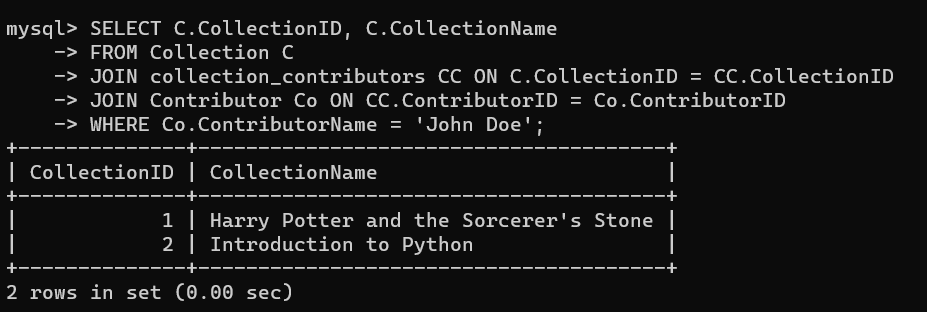
Figure 9. Collection output from MySQL.
In this part, because the contributor’s name is need. The WHERE part should help the database locate the data and the primary key (CollectionID) would be listed and its attribute would also be shown in the figure 9. After all steps shown above, an application for the public library is shown. The whole application completes the function of name searching, list in alphabetical order, check information in certain time intervals, check the availability of different types of books, link relation between two or multiple entities and locate the books in different libraries.
4. Conclusion
In order to realize database system, the database is created in the MySQL. The database created in the MySQL would help customers use it searching for the books which satisfy their wish. The database in MySQL, through commanding, could provide other useful information to the customers such as the availability of books, the location of books and the status of books in the library etc. This application realizes functions which are mostly used in today’s life. Customers could have more requirements because of the function of this application is not comprehensive. The basic model is constructed, and the next step is adding variety functions to make the application more convenient and user-friendly. In this procedure, the system could become a multi-type of system suitable for not only PCs but also the mobile phones. What is expected on the cell phones. For example, the library database-manage-system could only been use in the library, in the future, the service could be on the mobile phones or other potable devises. For analysis, the data could store with large amount and an app could be published on the instant message application which could be used more conveniently. With an app, different libraries could allocate their special events and advertise the main activity of one library such as the history of the library. On the other hand, the artificial intelligence and big data should also be introduced in this application. The artificial intelligence could help the library more effectively managing their books and collections. There is no need of human beings to climb bookshelves, a robot arm could help. Also, through the big data, the library could analyse the data from different gender, age groups to find out which kinds of books need more collections. The favourites of customers could also be a good resource for the library to attract more customers through importing more kinds of books.
References
[1]. Jianghai Yang. Research and design of intelligent library management system based on big data. Library Hi Tech, 2018, 36. 3, 374-377.
[2]. Haiyan Su. Intelligent library construction in the era of big data. New Silk Road: late 2017, (14), 1.
[3]. Chen, R.H.. Status and Prospect of the Construction of Intelligent Libraries. Science and Technology Information 2018, 3(11).
[4]. Hu Yanling. Research on the Application of Artificial Intelligence in Library Work and Implications. Science and Technology Information, 2020, 18(30), 4.
[5]. Zhao, M.. Design and development of library management system. Science and Technology 2012 (29), 2.
[6]. Li Chunxia On the construction of characteristic databases in university libraries Technology Information 2008 (10), 1
[7]. Zhang Yu Research on the Construction and Utilization of Library Public Media Database in the Big Data Environment. Liaoning Normal University, 2014
[8]. Pan Yongsheng. The Development Direction of Traditional Libraries in the Era of All Media. News Research Guide, 2021,12 (09): 78-79
[9]. Liu Jingjia. On the Inheritance and Innovation of Digital Library Management over Traditional Library Management. Urban Construction Archives, 2020 (12): 123-124
[10]. Chapter 8 The Entity Relationship Data Model, Database Design – 2nd Edition (opentextbc.ca)
Cite this article
Wei,Z. (2024). The design of library database management system based on MySQL. Applied and Computational Engineering,38,41-50.
Data availability
The datasets used and/or analyzed during the current study will be available from the authors upon reasonable request.
Disclaimer/Publisher's Note
The statements, opinions and data contained in all publications are solely those of the individual author(s) and contributor(s) and not of EWA Publishing and/or the editor(s). EWA Publishing and/or the editor(s) disclaim responsibility for any injury to people or property resulting from any ideas, methods, instructions or products referred to in the content.
About volume
Volume title: Proceedings of the 2023 International Conference on Machine Learning and Automation
© 2024 by the author(s). Licensee EWA Publishing, Oxford, UK. This article is an open access article distributed under the terms and
conditions of the Creative Commons Attribution (CC BY) license. Authors who
publish this series agree to the following terms:
1. Authors retain copyright and grant the series right of first publication with the work simultaneously licensed under a Creative Commons
Attribution License that allows others to share the work with an acknowledgment of the work's authorship and initial publication in this
series.
2. Authors are able to enter into separate, additional contractual arrangements for the non-exclusive distribution of the series's published
version of the work (e.g., post it to an institutional repository or publish it in a book), with an acknowledgment of its initial
publication in this series.
3. Authors are permitted and encouraged to post their work online (e.g., in institutional repositories or on their website) prior to and
during the submission process, as it can lead to productive exchanges, as well as earlier and greater citation of published work (See
Open access policy for details).
References
[1]. Jianghai Yang. Research and design of intelligent library management system based on big data. Library Hi Tech, 2018, 36. 3, 374-377.
[2]. Haiyan Su. Intelligent library construction in the era of big data. New Silk Road: late 2017, (14), 1.
[3]. Chen, R.H.. Status and Prospect of the Construction of Intelligent Libraries. Science and Technology Information 2018, 3(11).
[4]. Hu Yanling. Research on the Application of Artificial Intelligence in Library Work and Implications. Science and Technology Information, 2020, 18(30), 4.
[5]. Zhao, M.. Design and development of library management system. Science and Technology 2012 (29), 2.
[6]. Li Chunxia On the construction of characteristic databases in university libraries Technology Information 2008 (10), 1
[7]. Zhang Yu Research on the Construction and Utilization of Library Public Media Database in the Big Data Environment. Liaoning Normal University, 2014
[8]. Pan Yongsheng. The Development Direction of Traditional Libraries in the Era of All Media. News Research Guide, 2021,12 (09): 78-79
[9]. Liu Jingjia. On the Inheritance and Innovation of Digital Library Management over Traditional Library Management. Urban Construction Archives, 2020 (12): 123-124
[10]. Chapter 8 The Entity Relationship Data Model, Database Design – 2nd Edition (opentextbc.ca)





